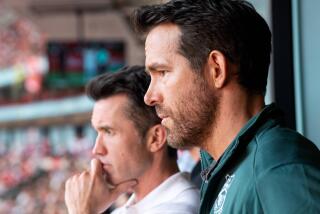Glorious Old Trafford Soccer Club Image Getting Kicked Around a Bit
LONDON — Old Trafford is to English soccer what Yankee Stadium is to baseball--home of the most glamorous team in the sport.
Just as the dream of many young baseball fans is to follow in the footsteps of Babe Ruth by playing for the New York Yankees, the ambition for hordes of budding English soccer stars is to play for Manchester United.
But United, rivaled only by Real Madrid in Spain as the most famous soccer club in the world, is in disarray. Its reputation, built 30 years ago by one man, the legendary manager Sir Matt Busby, is in danger of crumbling.
The warning signs flashed across Old Trafford, the field graced by Bobby Charlton, George Best, Denis Law and the late Duncan Edwards, when fans began calling last month for the head of the current manager, Alex Ferguson, United’s sixth since Busby.
“Fergie Out,” chanted fans on the terraces of the famous stadium after a team that began the new season full of promise in August lost for the third time in a row and the second at home.
The slump continued. United has gone eight league games without a win, pushing it dangerously close to the bottom of the English First Division despite a spending spree to buy the best players available.
Ferguson has spent more than $18 million on strengthening the team in his three years at United--about $12 million since June, when Neil Webb and Mike Phelan were signed to bolster a midfield in which England captain Bryan Robson was so often a lone force.
The best Ferguson’s side had managed until this season was second place behind Liverpool in the 1987-88 league campaign and the quarterfinals of the F. A. Cup.
The future, despite a vote of confidence from club Chairman Martin Edwards, looks bleaker for Ferguson, especially if Edwards relinquishes his control of the club.
“We must begin to get things together quickly,” a worried Ferguson said recently.
Further pressure was put on Ferguson when Howard Kendall, the former Everton manager, who has expressed a desire for the coveted United post, was appointed recently at struggling local rival Manchester City.
Success-starved fans look back not just to the heady days of the “Busby Babes” in the 1950s and ‘60s, which culminated in the 1968 European Cup triumph, but even to the relative success of two F. A. Cup victories under Ferguson’s predecessor, Ron Atkinson.
“You know you have problems when the fans turn against you,” Atkinson said. “Old Trafford is a theater for entertainment, drama and spectacle. It’s not a stadium where you should hear bellyaching or fans bickering. That destroys the magic.”
The rot on the field set in with a series of injuries starting when Webb ruptured his Achilles’ tendon in September after only four games.
Problems were by then already widespread upstairs in a takeover saga that has both angered and embarrassed Busby and some of his brilliant proteges of the glory days, most notably Charlton.
“I’m not interested in becoming the chairman,” Charlton answered after suggestions he might bring dignity back to the club by taking over its top position.
Busby, 81 and the club president, was moved to say: “Recent events have demonstrated only too clearly the problems that can arise from private ownership when the time comes for the club to be sold.”
Michael Knighton, a 37-year-old real estate tycoon, appeared to have bought the club for $31 million at the start of the season. He celebrated by taking the field at Old Trafford in Manchester United’s famous red colors before the kickoff against Arsenal.
“To continue the legend of Manchester United and provide the team that both the players and loyal supporters deserve, the club must have a solid financial base. We are dealing with a British institution,” he said.
Two months later, Knighton backed out of the deal.
Knighton had divulged club secrets, and Charlton said, “When Mr. Knighton gave out confidential information which the board did not think he should have done, I think it cheapened the image of the club.”
United suffered another blow to its sagging reputation when a bomb scare interrupted an acrimonious annual meeting of the shareholders in December.
Edwards staved off shareholders’ demands for his resignation and calls for the club’s shares to be made public.





